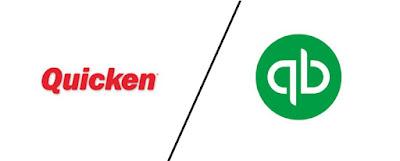When it comes to managing your personal and business finances, having the right tools at your disposal is essential. Two popular options in the market are Quicken and QuickBooks. But how do you choose between these two powerful financial management software? In this blog post, we'll dive into the world of Quicken vs QuickBooks, exploring their key differences, pros and cons, and ultimately helping you make an informed decision for your financial needs. So grab a cup of coffee, sit back, and let's navigate through this exciting comparison!

Overview Of Quicken vs QuickBooks
Quicken vs QuickBooks are both popular financial management software, but they serve different purposes. Quicken is primarily designed for personal finance management, helping individuals track their expenses, budget their money, and manage investments. It offers a user-friendly interface with features like bill payment reminders, investment tracking, and tax preparation tools.
On the other hand, QuickBooks is geared towards small to medium-sized businesses. It provides comprehensive accounting features such as invoicing, payroll processing, inventory tracking, and financial reporting. QuickBooks also allows users to manage vendor payments and customer transactions seamlessly.
While both software have overlapping functionalities such as expense tracking and generating reports, the key difference lies in their target audience. Quicken focuses on simplifying personal finances while QuickBooks caters to the complex needs of businesses.
If you're an individual looking for a tool to gain control over your personal finances or organize your investments efficiently, Quicken might be the right choice for you. However, if you own a business or plan to start one soon and require robust accounting capabilities along with advanced features like payroll management or inventory tracking - then QuickBooks would be more suitable.
In the next sections of this blog post we'll take a deeper dive into each software's pros and cons so that you can make an informed decision based on your specific requirements.
Key Differences Between Quicken vs QuickBooks
When it comes to managing your personal and business finances, choosing the right software is essential. Two popular options on the market are Quicken and QuickBooks. While both are designed to help you stay on top of your financial game, they do have some key differences that may sway your decision.
Quicken is primarily a personal finance management tool. It allows you to track expenses, create budgets, and manage investments all in one place. This makes it ideal for individuals who want a comprehensive view of their personal finances without the need for complex accounting features.
On the other hand, QuickBooks is geared towards small businesses and offers robust accounting capabilities. It enables users to handle invoicing, payroll processing, inventory tracking, and more. With its emphasis on business operations, QuickBooks provides detailed reports that can help you make informed decisions about your company's financial health.
Another important distinction between these two software options is their pricing structure. Quicken operates with a subscription model where you pay an annual fee for access to updates and support services. In contrast, QuickBooks has multiple versions available (such as Pro or Enterprise) which come with different pricing plans depending on your needs and preferences.
In terms of user interface and ease of use, Quicken tends to be more user-friendly with its intuitive design catering towards individual users' needs while still offering powerful tools at their fingertips.
QuickBooks may require some learning curve due to its extensive functionality but provides a steeper learning curve when trying out complex features suitable for businesses.
Ultimately deciding between Quicken vs QuickBooks depends on whether you're looking for personal finance management or complete accounting solutions tailored towards running a business effectively.
Consider evaluating what specific features align with your requirements before making an informed choice based on budgetary constraints too!
The Pros And Cons Of Quicken vs QuickBooks
When it comes to managing your personal and business finances, both Quicken and QuickBooks offer a range of features that can help streamline your financial tasks. However, each software has its own set of pros and cons that you should consider before making a decision.
Let's start with the pros of using Quicken. One major advantage is its user-friendly interface, which makes it easy for individuals to track their personal finances. From budgeting tools to investment tracking, Quicken offers comprehensive features for managing personal finances effectively. Additionally, Quicken allows users to sync their bank accounts and credit cards, providing real-time updates on transactions and balances.
On the other hand, QuickBooks is designed specifically for small businesses and offers more robust accounting capabilities compared to Quicken. It enables users to manage invoices, track expenses, generate reports for tax purposes, and even handle payroll tasks. Moreover, QuickBooks integrates seamlessly with other business applications like CRM systems or payment gateways.
However, one potential drawback of using Quicken is that it may lack some advanced features required by larger businesses or accountants who need more detailed financial reporting options. QuickBooks also tends to have a steeper learning curve due to its extensive range of accounting functions.
Which One Is Right For You?
Now that you have a better understanding of the key differences between Quicken and QuickBooks, it's time to determine which software is right for you. The decision ultimately depends on your specific needs and requirements.
If you are an individual looking to manage your personal finances, track expenses, create budgets, and monitor investments, then Quicken may be the best choice for you. Its user-friendly interface and comprehensive features make it ideal for individuals who want to take control of their financial lives.
On the other hand, if you are a small business owner or self-employed professional in need of robust accounting tools like invoicing, payroll management, inventory tracking, and tax preparation assistance, then QuickBooks is likely the better option. It offers advanced functionalities specifically designed to meet the needs of businesses.
Consider factors such as budget constraints, technical expertise (or willingness to learn), scalability potential for future growth if applicable - these will all play a role in determining which software aligns best with your goals.
Ultimately though, both Quicken and QuickBooks offer free trials so I'd encourage giving them a test drive before making a final decision. This will allow you to experience firsthand how each platform works and whether it fits seamlessly into your financial workflow.
Remember that making an informed decision will not only save precious time but also help optimize your personal or business finances effectively!
Conclusion
In the battle of Quicken vs QuickBooks, there is no clear winner as both software have their own unique features and benefits. It ultimately boils down to your specific needs and preferences.
If you're a small business owner looking for comprehensive financial management tools, QuickBooks may be the better choice. Its robust accounting features, invoicing capabilities, and ability to handle multiple users make it ideal for businesses of all sizes.
On the other hand, if you're an individual or a household seeking effective personal finance management solutions, then Quicken might be more suitable. With its focus on budgeting, tracking expenses, and managing investments, Quicken offers a user-friendly experience that can help you stay on top of your finances in a hassle-free way.
It's important to carefully evaluate your requirements and consider factors such as price point and ease-of-use before making a decision between Quicken vs QuickBooks.
Remember that both software options offer free trials or money-back guarantees so you can test them out before committing fully. Take advantage of these opportunities to see which one aligns best with your needs.
Whether you choose Quicken or QuickBooks, rest assured knowing that either option will provide valuable tools to streamline your financial management processes and empower you to make informed decisions about your personal or business finances.

